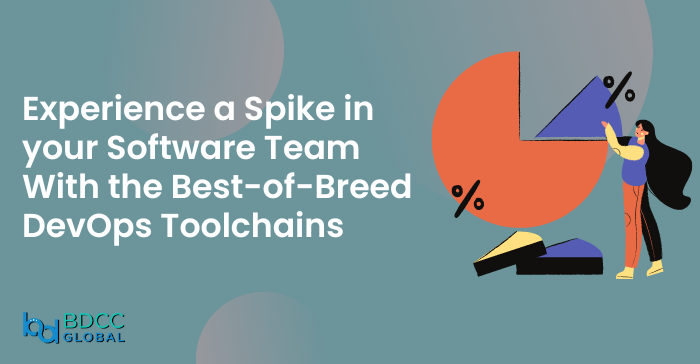
The DevOps toolchain is a group of tools that facilitates the creation, administration, and deployment of software. Organizations use best-of-breed DevOps toolchains to manage and automate DevOps processes across the whole software development lifecycle. There is no single technology that sustains the concepts and practices of toolchains; rather, it is a culture shift in which architecture and operations are integrated. A DevOps toolchain, on the other hand, is a group of technologies that work together to create, construct, test, manage, and run both systems and software. These tools usually come from different providers.
Let’s understand the objectives and advantages of DevOps Toolchains.
“Through the enforcement of DevOps toolchains, software teams can flawlessly manage finance, situation, time, and much more.”
Why Are Best-Of-Breed DevOps Toolchains Necessary?
Businesses must swiftly meet customer expectations and deliver new software regularly for ensuring market competitiveness. For this very reason, modern software development must progress quickly. Now, years of work must be finished in only a few weeks or days. Development and operations teams use best-of-breed DevOps toolchains techniques to collaborate swiftly and finish projects.
Toolchains have made it achievable for departments ranging from development, and IT operations, to security. In order to seamlessly produce greater dependable solutions, it improves team coordination and collaboration. Any team adopting a DevOps culture with methodology and tools becomes equipped to respond to client requirements. This increases confidence throughout the applications the team produce and completes business objectives more quickly.
The key to achieving optimal tool automation or enabling the software team’s potential, software development lifecycle is a DevOps toolchain. The numerous talents needed to quickly and consistently generate high-quality software are coordinated and automated by the DevOps toolchain.
What is the Objective of the Best-of-Breed DevOps Toolchains?
This objective guided the development of the DevOps toolset. Instead of wasting time delegating these activities to different members of your development team, the toolchain will handle everything for you and help you solve problems swiftly. DevOps is a notion that will give top-notch results in terms of cost and product delivery. Engineers with experience with a range of DevOps tools are in high demand by businesses. The best-of-breed DevOps toolchains are necessary for the reasons listed below:
1. Financial and Time Management Planning
These tools will make the association’s approach to product improvement simpler. Framework bottlenecks would be removed if this were done. The advantages of these devices include faster work and more affordable programming creation. Spending less on item interaction allows you to increase your own benefits and keep the business solvent.
2. Accurate Situational Management
People make expensive blunders because they are thoughtless. For this reason, you must employ and have faith in these tools. They’ll make sure you expend less energy addressing mistakes and hazards. DevOps toolchains ability to respond to various scenarios will be improved by the use of a pipeline and this gadget design.
3. Quicker Arrangements
The majority of the stages of the product improvement cycle will be computerized by an integrated toolchain. The cycle will be able to operate autonomously thanks to computerization, which will speed up operations. The workstream receives strong and productive item deliveries when DevOps tools are used.
Best-of-breed DevOps toolchains toolchain makes it attainable to quickly enhance updates to the market. DevOps design in charge of examining, affirming, and responding to risks for quick deliveries.
4. Managing Inefficiencies
The purpose of a DevOps toolchain is to minimize the time and resources spent physically concentrating on creative endeavors. Institutions that receive toolchains spend more time improving because of the less emphasis on correcting framework issues. The company has successfully eliminated errors that endanger the success of the entire engagement in this way.
Advantages of a DevOps Toolchain
An organization can benefit from using best-of-breed DevOps toolchains in a number of ways, including the following:
1. Quick product delivery: DevOps tools can automate a number of steps in the software delivery process. As a result, inventive products are created and delivered to clients rapidly. This procedure frequently promotes the development of things that can offer businesses a competitive advantage over competitors.
2. Better resource management: Automating manual processes can reduce the amount of money a company spends on resources. Because the processes are automated, errors brought on by human error or inefficient time management are also diminished. This results in improved management of resources, including money.
3. Enhanced collaboration: A DevOps toolchain improves the development process by removing restrictions between teams. Because everyone on the team is working in unison, there is no confusion about who is doing what and when, which avoids the final product from being delivered prematurely.
4. Effective problem-solving: A best-of-breed DevOps toolchains ensure high quality, a quick deployment process, and swift problem resolution. To accomplish this, notifications are used to inform the team of any potential issues promptly. This quick feedback is directed at that. Then, before problems worsen and impact the end user, developers can take steps to repair them.
Bottom Line
The technology and tools allow development with the help of best-of-breed DevOps toolchains. It helps organizations with operations to collaborate with the whole software lifecycle making up a DevOps toolchain.
BDCC
Latest posts by BDCC (see all)
- DevOps for eCommerce: Strategies to Handle Traffic Surges and Scale Seamlessly - March 4, 2025
- The Rise of Platform Engineering: Transforming DevOps for the Future - February 28, 2025
- Securing Your Infrastructure as Code: Best Practices in Terraform Security - February 25, 2025

